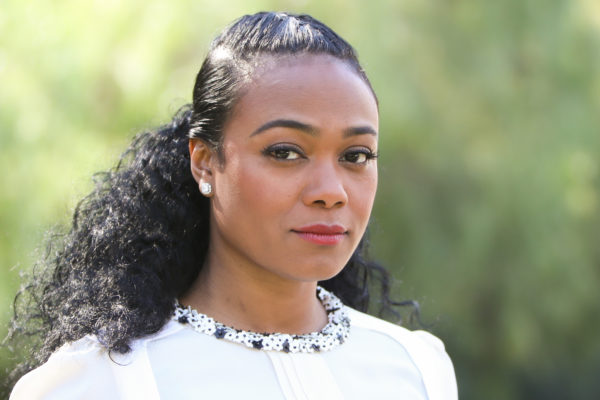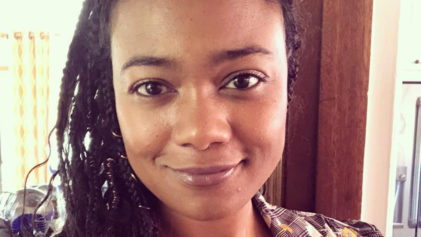Actress Tatyana Ali recently opened up about the traumatic birth of her first child, in the hopes that other expectant Black mothers do not experience the same.
Ali spoke at BlogHer Health 2021 with Sugaberry Founder Thai Randolph, and much of her conversation was dedicated to advocating for the maternal health of Black women in the United States — who have disproportionately high rates of death related to pregnancy or childbirth, and the crisis of pregnancy-related death spans income and education levels, reported SheKnows.

Ali pointed out that even someone as fortunate as her was not immune to the factors contributing to maternal death, and it opened her eyes to the inequalities inherent within the health system.
“I lived a very privileged life,” said the actress who played Ashley Banks on the ’90s sitcom “The Fresh Prince of Bel-Air.” “The birth of my son and my pregnancy was really my first interaction with a type of racism that could kill me and affect the health of my child.”
What Ali considers an encounter with inequality and racial injustice led the wife and mother of two to testify about this pressing issue in front of Congress via Zoom for the May 6 hearing, “Birthing While Black: America’s Black Maternal Health Crisis,” according to Essence. She shared how the incredibly personal event of her child’s birth was marred by such incompetence and indifference that it could easily have ended fatally for her or her son.
“When I asked my OB-GYN what positions I could be in during labor and delivery, he said that I ‘could hang from the lights’ if that made me happy,” Ali said. “This being my first birth, the dismissal of my very earnest query into birthing techniques hurt. I felt silly. That should have been a warning.”
She went on to describe a level of care that was underscored by careless and contemptuous actions by her physicians.
“One doctor climbed onto the side of the bed and pushed his forearm into my belly so hard that I could still feel the pain days later,” she remembered. “My baby had been crowned for hours. I could feel his hair. We said “no’ when they offered forceps. They used a suction, a plunger-type apparatus and tried four times. The suction aggressively popped off of his head again and again. I knew instinctively that they would hurt my baby irreparably if this circus continued.”
Ali said that after eventually asking for a C-section, one doctor “pushed my baby back inside me in an extremely dangerous procedure called the Zavanelli maneuver. I began to convulse and shake. Then my world went dark.”
Her son, Edward, made it through the delivery, but had to remain at the hospital in the neonatal intensive care unit, and, she said, he could not urinate without assistance “because of his traumatic birth.”
“When we left the hospital it felt like we were running,” Ali said at BlogHer.
Her emotional story was among those the House Committee on Oversight and Reform heard during its May 6 hearing.
According to The Commonwealth Fund, “The most recent U.S. maternal mortality ratio, or rate, of 17.4 per 100,000 pregnancies represented approximately 660 maternal deaths in 2018. This ranks last overall among industrialized countries.” The maternal death ratio for Black women (37.1 per 100,000 pregnancies) is 2.5 times the ratio for white women (14.7) and three times the ratio for Hispanic women (11.8). And a Black mother with a college education is at a 60 percent greater risk for a maternal death than a white or Hispanic woman with less than a high school education.
“Many are now scared to start families because they know that we are dying in hospitals. We don’t have to lose anyone else. We need to be heard and we need to be believed,” Ali told Congress.
For Ali, she told Randolph that the full weight of the violation she underwent did not become clear to her until she sought counsel from others in “the reproductive justice space.”
“When we were healing our wounds the best we could, not even knowing our story fit neatly in the statistics, a lactation consultant asked what happened,” Ali said. “When I told her, the look on her face let me know that what I was feeling was real — and that something needlessly horrible had happened.”
Ali was then spurred on to become more active within the field of reproductive justice, joining groups such as Black Mamas Matter. It became evident to her that what happened during her birth was not only common, but a crisis.
“The guilt is something I carried with me for a very long time, until I started to hear similar stories and realized there’s something bigger happening,” Ali said. “That my story is one piece of it. And it didn’t have to be that way.”
When it came to her second pregnancy with her son Alejandro, Ali took control, and searched for “a black midwife who I felt connected to.”
Finding her, she added, “was not easy to do and there are historical reasons for that and there are corrections for that too.”
However, she eventually located one whose compassion and respect for her was, as Ali called it, “a shift in care.”
“My second birth, for both my husband and I, it completely changed, it cleared up the trauma.”
Ali advised those who have given, or are about to give birth, to not be afraid of the process, or let their own painful ordeal overtake them. Instead, she encouraged them to be open about their story and their circumstances, and to feel emboldened to take charge to get the kind of care that they want and deserve.
“Share your story, share it, share it, do not stop digging. You can have the type of birth that you want, the kind of support that you want. We are often talked about as a needy community, that we have more needs than anyone else,” she said. “Any mother of any ethnicity knows we need community, we need support, we need help when things go wrong. Unfortunately, our systems are such that some people get those needs met and some don’t. Remember that and let that empower you to get what you need.”

